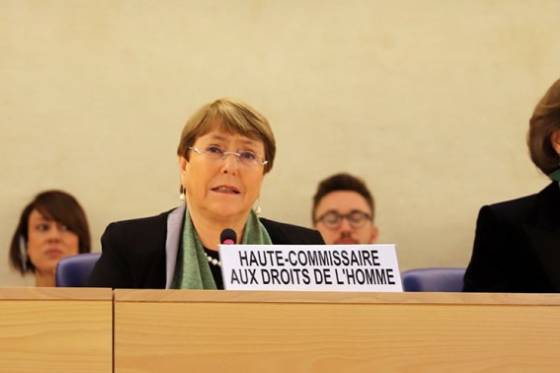United Nations High Commissioner for Human Rights Michelle Bachelet today rejected moves by Sri Lanka to appoint yet another Commission of Inquiry to address issues related to human rights violations.
The Government yesterday formally withdrew its co-sponsorship from the UN Resolution on Sri Lanka and offered to address issues on accountability through a new domestic process.
Presenting a report on Sri Lanka to the UN Human Rights Council (UNHRC) in Geneva today, Bachelet said that domestic processes have consistently failed to deliver accountability in the past and so she is not convinced the appointment of yet another Commission of Inquiry will advance this agenda.
“As a result, victims remain denied justice and Sri Lankans from all communities have no guarantee that past patterns of human rights violations will not recur,” she said during the 43rd Session today.
She expressed regret that the new Government has announced a very different approach to the commitments previously made in resolution 30/1 which she says risks setting back efforts to advance reconciliation, accountability and human rights.
“The State must work for all its people and the needs of all communities, particularly the minorities, must be acknowledged and addressed. I urge the Government to preserve and build upon the gains which have been made over the last few years. In particular, I encourage the Government to ensure the Office on Missing Persons and the Office of Reparations are provided with political and resource support. The families of missing persons from all communities deserve justice and redress,” she added.
She also said that Sri Lanka’s independent institutions, strengthened under the 19th Constitutional Amendment, are a key pillar in its democratic structure and the space for civil society and independent media should be protected.
“I am therefore troubled by the recent trend towards moving civilian functions under the Ministry of Defence or retired military officers, and renewed reports of surveillance and harassment of human rights defenders, journalists and victims. The increasing levels of hate speech, and security and policy measures appear to be discriminately and disproportionately directed against minorities, both Tamil and Muslim,” she said.
She noted that the fundamental problem remains that Sri Lanka has still not addressed impunity for past violations, nor undertaken the security sector reforms needed to address their drivers and enablers.
The High Commissioner said that systemic barriers that continue to exist within the criminal justice system remain an impediment to real justice. (Colombo Gazette)

